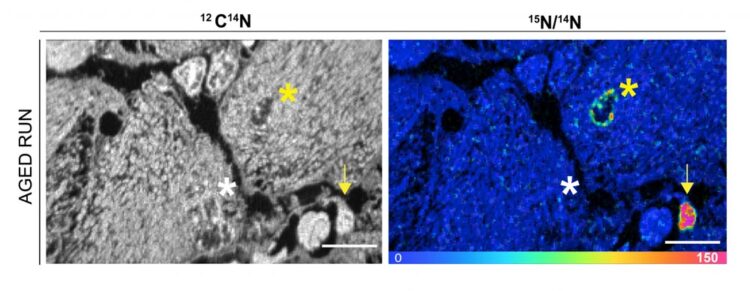Physical activity stimulates the generation of new heart muscle cells in aged mice

Figure Publication Lerchenmüller: Physical activity stimulates an increase in cardiac muscle cells in the aged mouse heart. In the experiment, the cells are visualized using a special staining method. Copyright: American Heart Association
Researchers at Heidelberg University Hospital together with a team of international researchers demonstrate a positive effect of physical activity on the generation of new heart muscle cells in older hearts in an animal model / Molecular analyses provide information on the underlying mechanisms / Study results published in the journal Circulation.
Can physical activity support the generation of heart muscle cells (cardiomyocytes) even in aged animals? Researchers at Heidelberg University Hospital (UKHD) together with a team of international collaborators demonstrated positive effects on the formation of new heart muscle cells (cardiomyogenesis) in aged mice and investigated the underlying cellular and molecular mechanisms. The current research results have been published in the journal “Circulation”.
The heart of adult mammals has a very limited ability to generate new cardiomyocytes. With aging, this capacity continues to decrease, while at the same time the risk of cardiovascular disease increases. Dr. Carolin Lerchenmüller, head of the “Cardiac Remodeling and Regeneration” research group in the Department of Cardiology, Angiology and Pneumology at the UKHD (Medical Director: Professor Norbert Frey), and her team have found evidence that physical activity stimulates the new formation of heart muscle cells in aging mice.
“In previous work, we have already demonstrated that regular exercise effectively stimulates cardiomyogenesis in younger mice. Now we have investigated the impact of physical activity on cardiomyogenesis as well as cellular and molecular mechanisms of in aged mice,” says Dr. Lerchenmüller. 20-months old mice underwent an eight-week voluntary wheel running exercise program. The team then studied new heart muscle cell generation using a combination of imaging, histological and molecular techniques. They compared the results with those of a control group of age-matched “sedentary” mice, i.e., mice that were not provided with a wheel. In addition, they compared the results with those of younger animals.
Prevention of cardiovascular disease in focus
The researchers found that the calculated annual rate of newly generated heart muscle cells in the “exercising” group of older mice was 2.3 percent. In contrast, there were no new heart muscle cells in the “sedentary” control group. A previous study with young animals had already shown that mice had a calculated annual rate of 7.5 percent new heart muscle cells through exercise, compared to 1.63 percent in the corresponding “sedentary” control group.
To better understand the mechanisms behind cardiomyogenesis, the team studied the hearts using molecular analysis techniques. They found similarities, but also differences, between young and aged hearts. The RCAN1.4 gene in particular captured their attention. It was activated exclusively in older hearts by the exercise program.
“Further studies will now have to show whether the findings can eventually translate into new ways of treating and preventing heart disease in humans,” explains Dr. Lerchenmüller.
The research is a project within the German Center for Cardiovascular Research (DZHK).
Wissenschaftliche Ansprechpartner:
Dr. med. Carolin Lerchenmüller
Leitung, Labor für kardiales Remodeling und Regeneration
Innere Medizin III, Kardiologie, Angiologie und Pneumologie
Universitätsklinikum Heidelberg,
Im Neuenheimer Feld 669
69120 Heidelberg
Carolin.Lerchenmueller@med.uni-heidelberg.de
Originalpublikation:
Lerchenmüller C, Vujic A, Mittag S, et al. Restoration of Cardiomyogenesis in Aged Mouse Hearts by Voluntary Exercise. Circulation. 2022 146:00–00. DOI: 10.1161/CIRCULATIONAHA.121.057276
Weitere Informationen:
https://www.klinikum.uni-heidelberg.de/zentrum-fuer-innere-medizin-krehl-klinik/…
Media Contact
All latest news from the category: Health and Medicine
This subject area encompasses research and studies in the field of human medicine.
Among the wide-ranging list of topics covered here are anesthesiology, anatomy, surgery, human genetics, hygiene and environmental medicine, internal medicine, neurology, pharmacology, physiology, urology and dental medicine.
Newest articles

High-energy-density aqueous battery based on halogen multi-electron transfer
Traditional non-aqueous lithium-ion batteries have a high energy density, but their safety is compromised due to the flammable organic electrolytes they utilize. Aqueous batteries use water as the solvent for…

First-ever combined heart pump and pig kidney transplant
…gives new hope to patient with terminal illness. Surgeons at NYU Langone Health performed the first-ever combined mechanical heart pump and gene-edited pig kidney transplant surgery in a 54-year-old woman…

Biophysics: Testing how well biomarkers work
LMU researchers have developed a method to determine how reliably target proteins can be labeled using super-resolution fluorescence microscopy. Modern microscopy techniques make it possible to examine the inner workings…





















